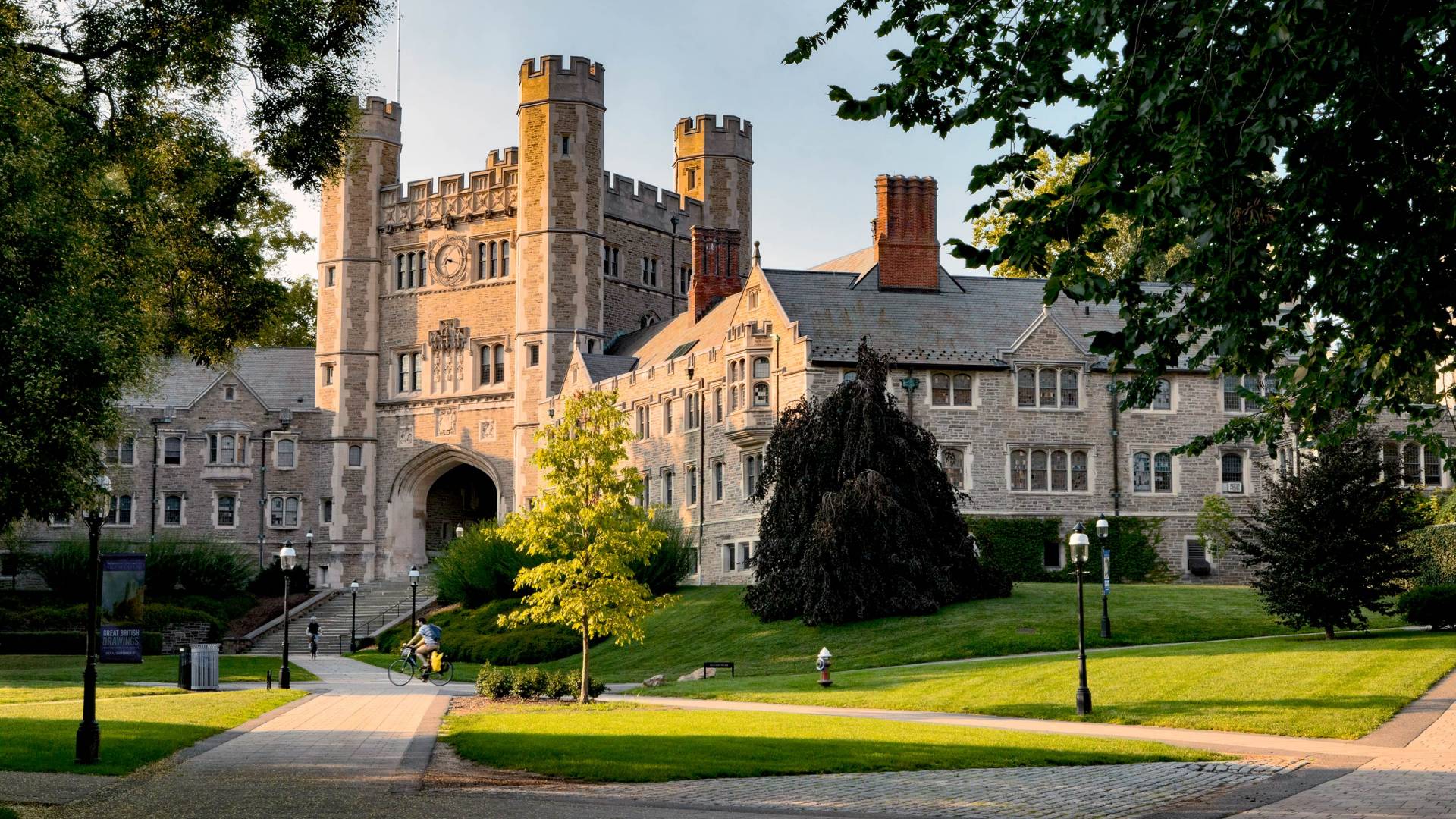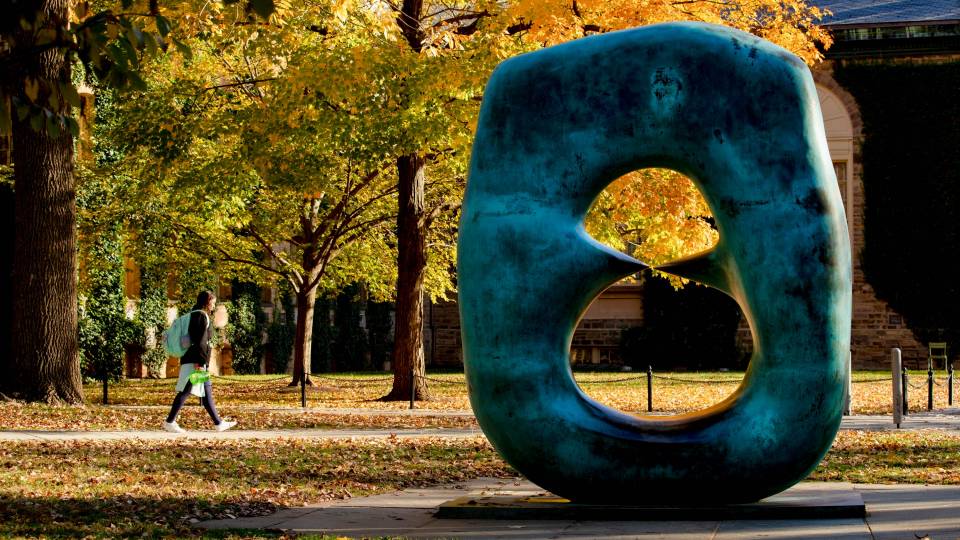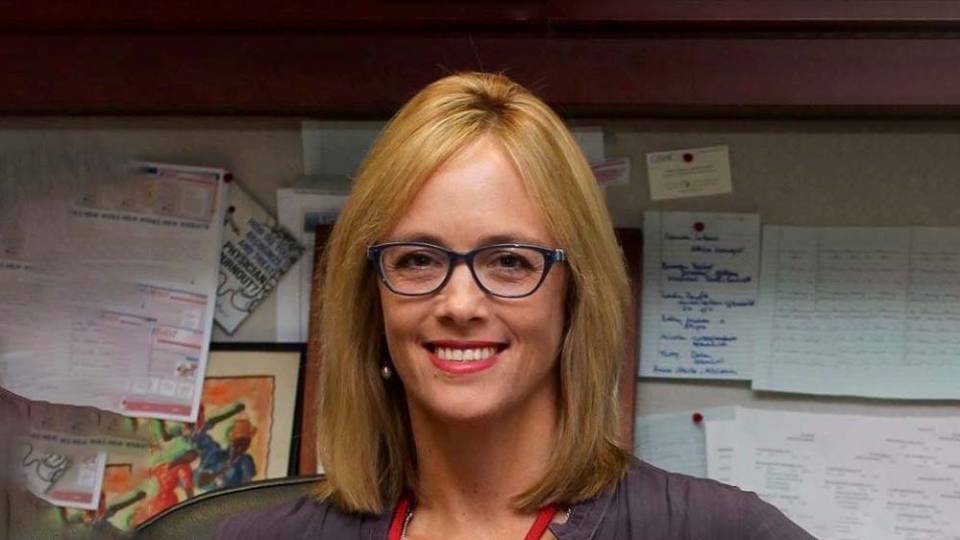AUG. 7, 2020 UPDATE: The undergraduate program will be fully remote in the fall semester. Please see President Christopher L. Eisgruber's Aug. 7 message for the latest information.
With focus on public health, Princeton will invite approximately half of undergraduates to campus each semester, most teaching to remain online
Dear members of the Princeton community,
When I wrote to you on May 4th, I said that Princeton was committed to providing the best undergraduate and graduate education consistent with the health and well-being of our community. I also identified a goal that continues to guide our efforts and planning: to restore our on-campus, in-person research and teaching enterprise as soon and as fully as public health principles permit.
Over the last two months, my colleagues and I have been studying the pandemic and identifying measures we can take to accommodate students on campus. COVID-19 is still a very new disease, and much remains unknown about it. Several points have, however, become clear. Based on the information now available to us, we believe Princeton will be able to offer all of our undergraduate students at least one semester of on-campus education this academic year, but we will need to do much of our teaching online and remotely.
First, although New Jersey, which was among the early epicenters of the pandemic in this country, has significantly reduced the incidence and spread of COVID-19, the United States is nowhere close to controlling the disease. Over the past two weeks, new cases have risen sharply in several states. Continued vigilance will be essential throughout the next year, and we should expect waves of infection to occur in the fall and most likely in the spring as well.
Second, COVID-19 appears to spread principally through the inhalation of airborne particles. As a result, the risk of transmission is highest when people are indoors and near one another for extended periods of time. Unfortunately, these conditions exist throughout collegiate life, including in classroom teaching, dormitory living, and communal dining.
Third, New Jersey is reopening carefully and responsibly. Both state law and public health guidance significantly restrict our options for the fall. This guidance presents special challenges for colleges and universities, including Princeton, that provide on-campus housing for nearly all of their students. For example, state law does not currently permit us to operate our dormitories at their full capacity, and it requires us to have adequate quarantine and isolation plans for the students we house. It also stipulates that we must maintain six feet of separation between students attending class. Under these circumstances, it would be pointless if not impossible to invite back all of our undergraduates in the fall term: we could not house them on campus or provide them with a meaningful residential experience.
Fourth, as I noted in my last letter, this pandemic is a long-term crisis. Though scientists throughout the world are working with unprecedented focus to find treatments and vaccines, there is no telling if or when they will succeed. We cannot simply sit on the sidelines and wait it out; we must all find ways to persist through it. For Princeton, that means we must both offer high-quality education remotely and also start working our way back toward residential education now, despite the obstacles that I have mentioned.
We will accordingly employ a model that invites to campus roughly half of Princeton’s undergraduates in each semester, and that offers every undergraduate who is able to return to campus the opportunity to be here for at least one semester. We will welcome the incoming Class of 2024, as well as rising juniors, back to campus in August. In the spring term, we will welcome back our sophomores and our seniors in the graduating Class of 2021.
We will also seek to accommodate a very limited number of other students whose special circumstances require them to be on campus in specific semesters. In the fall term, this will include a small number of seniors, designated by their departments, whose thesis research must be done on campus, meets all COVID-related safety requirements, and has been approved by the relevant principal investigator or faculty adviser and the Dean for Research. We will also accommodate students who face housing insecurity, new transfer students, and ROTC students on campus in the fall.
With regard to athletics programs this fall, the Council of Ivy League Presidents intends to announce a decision regarding intercollegiate athletic activity for fall 2020 on July 8. The Department of Athletics will have more information for varsity athletes at that time.
Because the living and teaching arrangements for Princeton’s graduate programs accommodate social distancing more easily than does our undergraduate program, we will invite all of our graduate students to campus. Graduate-level courses and graduate advising may occur in person or virtually, depending on the decisions of individual graduate programs. We have already begun a phased restart to our research enterprise.
Though we plan to invite every undergraduate student to spend a semester on campus, all undergraduates will have the option to complete the entire year remotely. As students consider their choices, they should bear in mind that the campus experience will be very different from an ordinary year. For example, most undergraduate teaching will be online rather than in person even for on-campus students. Many activities will be unavailable, impermissible, or highly regulated. Parties will be prohibited. Masks will be required in indoor spaces, including in all classrooms, laboratories, and libraries. Social distancing will be the norm. Travel will be limited. We will test students for COVID-19 when they arrive, and we expect to test them regularly thereafter. Isolation will be mandatory for students who test positive for COVID-19; quarantine will be mandatory for students who have been in contact with someone who gets COVID-19.
These restrictions are essential to protect the health of the Princeton community and to comply with New Jersey law. We will expect all members of our campus population to affirm that they understand these constraints and accept the responsibility to abide by them if they come to campus. Undergraduates will be required to sign a social contract describing their responsibilities in this pandemic. Our collective success will depend on all of our individual actions. If students are unwilling or unable to comply with the restrictions described above and in the social contract, they should not come to campus.
To reduce travel that increases both the risk of infection and the need to quarantine, we are planning to alter Princeton’s academic calendar for the 2020-21 academic year. We expect to begin the fall semester two days earlier than previously announced, on August 31; we will convert the fall break to a long weekend; and we will ask all students to leave campus before Thanksgiving. The fall reading period and examinations will be fully remote. We will likewise abbreviate spring break, making it a long weekend to reduce travel during the second semester.
Because most of our teaching will have to be online, we have devoted new resources and planning to enhance our online offerings. Faculty members have been collaborating over the summer with one another, with the McGraw Center for Teaching and Learning, and with the Office of Information Technology. They are implementing lessons learned from last spring’s remote learning experience, increasing opportunities for student-faculty interaction, and revamping courses to fit the online environment. We look forward to engaging all of our students, both here on campus and around the world, in a unique and meaningful learning environment.
Despite the restrictions required by public health considerations, we are confident that Princeton will be able to offer an outstanding education to all of its students, whether they are studying on campus or remotely. The University is increasing its investment in both its online and in-person programming in order to address the challenges presented by the pandemic. We recognize, however, that no matter how successful the University’s remote offerings may be, the opportunity to study on campus carries important advantages, including access to campus facilities and peer-to-peer learning opportunities.
Because we anticipate that most undergraduates will have the opportunity to study on campus only for one semester or less, we will discount the University’s full-year undergraduate tuition by ten percent for this academic year. This discount will apply to all undergraduates, regardless of when or whether they are on campus. We will also apply other discounts to the undergraduate fee package, including the pro‑ration of room and board charges for shortened semesters and the elimination of some fees.
I am sure that all of you — students, parents, faculty, and staff — have a range of more detailed questions related to the year ahead. Answers to some of these questions are spelled out on our Fall 2020 website. Others will be shared with you in the days ahead. Still others will require some patience: while we wish it were possible to say that every problem has been solved and every question answered, we are in uncharted territory. There is still much work to be done before the start of the fall semester. The success of our efforts this fall will depend on cooperation from all of you. We ask for your understanding and patience as we work through the myriad details that must be addressed to make the coming year as successful and healthy as possible.
Before I close, I would like to emphasize two important points about the coming year. First, there are no guarantees about what will happen as the semester and the year unfold. The University will continue to reevaluate its plans in the months ahead. If developments allow, we will invite back more students in the spring. Unfortunately, it is also possible that matters will get worse. If so, we may have to send students home in the fall or reduce the size of the anticipated campus population in the spring.
Second, as these cautionary comments make clear, this year will be far from normal, whether students are on campus or not. This pandemic is among the worst crises ever to hit Princeton or college education more broadly. Princeton’s preferred model of education emphasizes in-person engagement, but in-person engagement is what spreads this terrible virus. While I wish that we might return immediately to the kind of campus life that we enjoyed when March 2020 began, this moment imposes different responsibilities upon us. I am grateful to all of you for shouldering those responsibilities together, and for approaching them with creativity, determination, and resilience.
To our students, I look forward to having you back on our campus when you can come. To all of you, I look forward to collaborating with you and supporting you as we pursue our teaching and research mission energetically, imaginatively, and passionately in the face of one of the greatest challenges ever to confront our University.
With best wishes,
Chris Eisgruber























